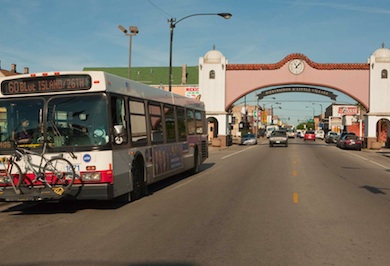Did You Know?
Transportation issues on the city’s Southwest Side during COVID-19

The COVID-19 pandemic has changed a lot of what we perceive and know about mobility and transportation.
In recent months, Active Trans met with more than 100 stakeholders who are invested in our work. We spoke with community partners, elected officials, department of transportation and transit agency officials, and residents across the city and suburbs.
As part of this process, we held a series of small-group conversations and solo conversations with stakeholders and two elected officials on the city’s Southwest Side. Though not all-encompassing, here’s a glimpse of what residents on the Southwest Side are experiencing.
MOBILITY FOR PEOPLE WITH DISABILITIES
As our mobility in the city adapts to the changing circumstances of the pandemic, people with disabilities have experienced some of the greatest challenges — and this is especially true on the Southwest Side. The transit shutdown in late May and early June was mentioned in our conversations as a major barrier for people getting where they needed to go.
More broadly, there are still ongoing concerns of the cleanliness of public transit and a desire for transparency about the cleaning processes.
Other comments made:
- People need access to paratransit to get to medical appointments, grocery shopping, and other crucial destinations.
- People found it disconcerting how the transit shutdown decision was made without concern for the disabled community.
- Need to push for free transit and free paratransit as well.
TRANSIT AND TRAVEL BEHAVIOR
Public transit remains important for communities on the Southwest Side, particularly for essential workers needing to get to and from work. One participant emphasized that ridership shouldn’t determine whether service should exist because there will always be people in need of it.
Other comments made about transit included:
- There is a need for more frequent service. One person mentioned waiting an hour for a bus near 55th and St. Louis.
- The Pink Line is one of the transit assets in Little Village.
- Public transit needs to be cleaned thoroughly to ensure safety. Some participants mentioned walking a lot more lately because of fears of taking transit.
ENVIRONMENTAL AND TRAFFIC SAFETY CONCERNS
On the Southwest Side, the proliferation of cars and trucks is a top concern for residents. Environmental factors play a major role in how people can move.
Some comments made included:
- Little Village is saturated with cars.
- There is a lot of truck traffic given the proximity of Southwest Side neighborhoods to the interstate and manufacturing facilities.
- There are concerns about the possibility of traffic crashes at high-risk intersections.
- Adapting the Chicago River area for walking and biking was brought up, as were concerns of environmental justice issues for residents.
BIKING
Some participants have observed more people biking in the community, particularly youth biking for leisure. However, others thought there were fewer people biking. This discrepancy could mean there’s a spectrum of new biking habits within this part of the city.
Other comments made were:
- There aren’t many bike lanes on the Southwest Side and there is a need for more so that people biking are safer.
- A lot of young people bike together and end up biking in the middle of the street due to a lack of bike lanes.
- West Lawn is not a bike-friendly area.
- Streets like Western and California are challenging for people on bikes, particularly when crossing the river and navigating truck traffic.
COMMUNITY CONCERNS
In addition to transportation issues, participants brought up other pressing concerns for their communities. These included job security and mental health access.
Some other issues that came up:
- Food access is a top issue.
- Residents are having a hard time paying rent.
- There has been a rise in unemployment and domestic violence.
- The availability of resources for youth came up, such as access to internet and computers in lieu of formal schooling.
___________________________________
Thank you to those who took the time to speak with us about transportation, mobility needs, and creating a vision for a more resilient future. We look forward to advocating for and implementing that vision together:
- Theresa Mah, Illinois State Representative, 2nd District
- Michael Rodriguez, 22nd Ward Alderman
- Karen Guadarrama, Universidad Popular
- Sergio Rodriguez, Hubbard HS, Metropolitan Family Services
- Ray Arroyo, Enlace
- Trevor Clarke, Xail Hernandez: Working Bikes
- Ruth Rosas, Lurie Children’s Hospital
- Juana Villegas, Maria Gomez, Maria Ortega, Martha Raquel Garcia, Silvia Hernandez: Brighton Park Neighborhood Council
- Adam Ballard, Access Living
Be sure to read the companion blog posts featuring Chicago’s West Side and South Side.
Not member of Active Trans? Please join us. People like you allow us to do the important work of improving the sustainable transportation options in Chicagoland.
Photo courtesy of LISC Chicago and Eric Young Smith.
Make a Donation
Your tax-deductible donation supports the important work that Active Trans does throughout the region
